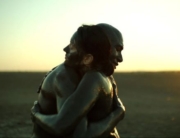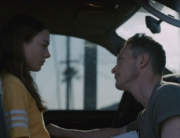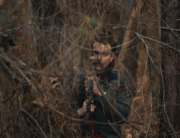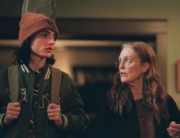Rick Alverson’s previous film Entertainment is probably one the strangest, saddest, most unconventional, and uncomfortable films I have ever seen. I am happy to have seen it. I never need to see it again.
His new film, The Mountain, is far more conventional and manageable in terms of narrative drive, but it’s a deeply disturbing film that has a lot to say about conformity and how we treat the least fortunate in our society.
Set in the mid-’50s in the Pacific Northwest, it centers on Andy, a young man whose father has recently died and whose mother has been committed long ago to an asylum. When selling his father’s effects at an estate sale, he meets Wallace Fiennes, his mom’s doctor. Seeing someone who needs direction and in need of assistance, Fiennes invites Andy to join him. Fiennes’s job? Traveling to mental asylums and performing lobotomies on patients. He wants Andy to photograph patients before and after the procedure, but he hires him mostly because he’s desperately lonely.
From this scenario, we are privy to one of the oddest, most depressing road movies you are likely to come across. Andy (a fairly astonishing Ty Sheridan) is shy, soft spoken, and intense. There is very little that lets you in on his thoughts, yet he is the audience’s avatar. The Mountain is his story. Fiennes (the always magnetic Jeff Goldblum), a shambolic, charismatic womanizer, does most of the talking and drives the story line, with Andy trailing in his wake, rootless and grieving for his family.
Alverson doesn’t flinch from the horrid realities of asylum life pre–Titicut Follies, but his instinct is for the beautifully composed picture, so there’s not so much a disconnect as there is a tension seeing these awful places so beautifully filmed. Andy takes all this in in a passive manner, but it clearly affects him, and a breach occurs after he meets and becomes close to a young woman, Susan (Hannah Gross), due for one of Fiennes’s patented procedures.
Most of the film moves in a relatively clear narrative arc until the last third, where it takes a surreal turn and becomes fragmented. This is generally where Alverson feels most comfortable, as he is a provocative, confrontational filmmaker. This section is fascinating, because it lets actor Denis Lavant, who plays Jack, Susan’s father, off the very thin leash he’s been kept on. Jack, who runs his own idiosyncratic therapy group, is a barely hidden well of aggression. His anger is released in cryptic monologues that switch from French to German and back to English at the drop of a hat. The delivery is so incomprehensible that they require subtitles. Lavant throws himself physically into the words like a fly slamming repeatedly into a window. It is simultaneously magnetic, beautiful, and very unnerving.
All the actors are firing on all cylinders: Goldblum plays Fiennes as arrogant and lonely and aware that his methods are falling out of favor and he is being considered more and more with contempt by his professional community. Sheridan essays Andy as someone who is practically catatonic. In mourning for his family and convinced that his mother is speaking to him through a Ouija board, Andy is desperate for a parental figure. Fiennes fits that bill and gives Andy less a sense of purpose than a sort of structure, twisted as it may be. Sheridan’s brilliance is that there’s a swirl of emotion going on inside him that you sense through his placid exterior. It’s a fairly extraordinary performance, and Gross, as Susan, has less time to make an impression but does quite a bit with what she has.
Alverson excels in portraying outcasts and losers and those on the fringes of society, which places him in the company of Tim Burton and especially David Lynch, and even Jim Jarmusch, but unlike those three, Alverson never romanticizes his subjects. He approaches them with deep sympathy and is clearly angry at a world that dismisses and marginalizes them, but he does not see them as pure or misunderstood or sexy. They are not anti-heroes. They are deeply flawed human beings worthy of sympathy and respect, a message that resounds even more sharply during these cynical, tribalistic times.







Leave A Comment